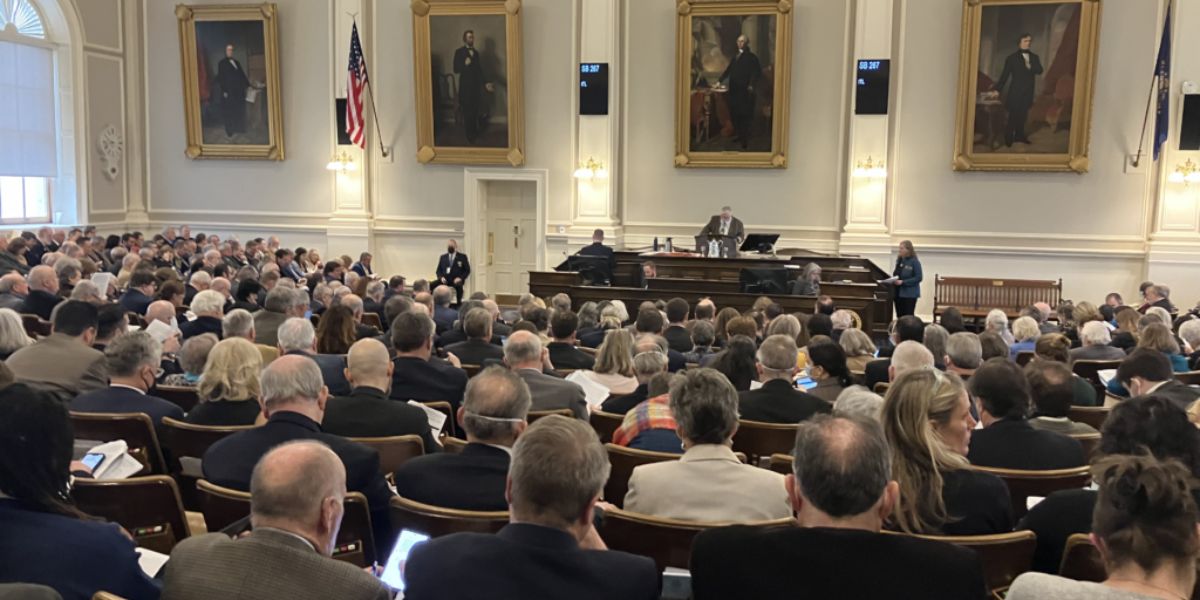Lawmakers in the Live Free or Die state concluded that the motto does not apply to young transgender people, who will not be able to undergo elective gender transition surgery until they are 18 or older.
In a series of close votes Thursday, the House defeated proposals that would have helped transgender people and voted to join approximately 20 other states in prohibiting transgender surgery for anyone under the age of 18.
After nearly an hour of debate, the House approved House Bill 619, which prohibited the technique, by a vote of 188-175.
The House did pass an amendment that modified the bill while maintaining prohibiting medical operations on minors under the age of 18.
Proponents of the ban argue that there is insufficient proof that executing irreversible medical treatments on children is safe or has a positive outcome.
Rep. Erica Layon, R-Derry, said the Health and Human Services and Elderly Affairs Committee was advised by medical professionals that the operations are safe and successful, but no evidence was provided because no studies on persons under the age of 18 had been conducted.
She stated that the medical standards were altered 16 months ago to allow surgery on those under the age of 18, but that it was not an issue prior to that.
Layon stated that rather than trickling down, the new requirements have been adopted fast in an effort to help these children.
“But we need to wait, we need to pause,” she went on to say. “Is it OK to tell parents the procedure is safe and effective if there is no data?”
Others, however, claim that the treatment is rarely performed on anyone under the age of 20 who has undergone significant therapy, hormone therapy, and lived as their desired sexual orientation for a year.
Rep. Gerri Cannon, D-Somersworth, said she had the treatment as an older adult and was interviewed by three doctors who wanted to be sure it was what she wanted to do.
She noted that there are many good health care providers in New Hampshire who use the best available equipment and that processes are constantly improving to be more effective and efficient.
“This is not about surgery, but about why we are considering putting medical processes into New Hampshire law that is constantly changing,” Cannon went on to say, “and (medical providers) are constantly learning new ways to care for patients and new techniques.”
She stated that the bill is unlike anything the legislature has done before since it will necessitate ongoing monitoring and revisions in the law when changes in the area occur.
“It is not right for New Hampshire, it is not right for the transgender community,” Cannon went on to say. “I hope young people do not take this message badly, I am concerned about the health of many young transgender people.”
The bill is now sent to the Senate, where it is expected to pass as well.
House Bill 396, which empowers the state to recognize and separate persons based on their biological sex in three areas: public restrooms, sports, and correctional institutions, was also adopted by the House.

Rep. Bob Lynn, R-Pelham, said the separation is permitted under federal law in some circumstances, such as college athletics, where the separate but equal doctrine applies, and with privacy rights, such as in a public restroom.
Others, however, claimed that the bill was a step back from the civil rights that a Republican-controlled legislature and governor tried to enshrine just five years ago.
Rep. Shelley Devine, D-Nashua, said the bill would erase the previous legislature’s efforts to combat gender discrimination.
“This is a step back,” she went on to say, “and you risk fostering discrimination.”
Others contended that biological sex was not specified, which would allow people to discriminate based on gender, as has happened in Texas.
However, Lynn stated that if you presented that argument, a judge would laugh you out of court because courts and individuals make these decisions all the time.
“Of course, you can make these decisions that make sense for privacy protection and safety reasons,” Lynn went on to say.
The bill was approved by a vote of 192 to 184.
House Bill 264, which would have made it simpler for transgender people to change their gender on birth certificates, was defeated by a vote of 191-185.
The current procedure necessitates a court order, whereas the measure would have permitted the modification with the consent of a medical provider.
The original birth certificate, as well as other public records indicating the individual’s sexual orientation, would be kept.
House Bill 368, which would have protected parents of children under the age of 18 who had gender-altering surgery in New Hampshire, as well as health care providers, was killed by the House.
Some states, like Texas, want medical records from other states for transgender treatments performed on adolescents in order to pursue child abuse charges against the parents or providers.
Opponents of the law claimed it would convert New Hampshire into a sanctuary state for youngsters undergoing the surgery.
However, supporters claim that it safeguards privacy and parental rights.
The bill was defeated by a vote of 188-186.
